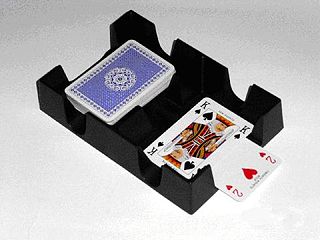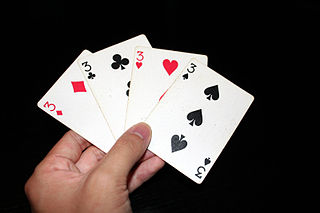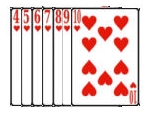Quatorze (the number "14" in French) is a 2+ player card game with origins in Lebanon.
Quatorze (the number "14" in French) is a 2+ player card game with origins in Lebanon.
Quatorze is played with 2 standard 52-card decks and 1 or 2 jokers mixed together. The ranking (in descending order), is Ace, King, Queen, Jack, 10, 9, 8, 7, 6, 5, 4, 3, 2, Ace.
The objective of Quatorze is to have the lowest possible score and cause the other players to reach a score of 201+.
The dealer alternates to the right each round with the first dealer chosen arbitrarily. The dealer shuffles the cards and the person to their left cuts the deck. If the bottom card of the cut section is a joker then the player that cut is allowed to keep the joker. The cut section in the player's hand is then placed on the table (stockpile) and the dealer deals the cards in their hand first, taking from the top of the stockpile if needed. The player to the right of the dealer is first dealt 3 cards then each next player (including the dealer) is dealt 2 cards at a time in an anti-clockwise fashion until each player has 14 cards except the player to the right of the dealer who should have 15. Any cards remaining with the dealer go on top of the stockpile.
First, the player with 15 cards strategically chooses 1 card to discard face up forming the discard pile. The player to their right can then either draw the top card on the discard pile or draw a (face-down) card from the stockpile. The player can only draw the top card from the discard pile if it will then be used to meld their cards. Melding is how players get rid of their cards in order to maintain a low score. Going down consists of cards being placed on the table either in triplets or quadruplets of different suits (e.g. 10 of spades + 10 of hearts + 10 of clubs or 3 of spades + 3 of hearts + 3 of diamonds). In addition, a series of cards of the same suit can be placed (e.g. 9 of hearts, 10 of hearts, Jack of hearts etc..) with a minimum of three cards in the series and a maximum of 13. Essentially, the sum of all the cards a player uses to meld the first time must amount to a minimum of 51 (e.g. 7 of hearts, 7 of spades, 7 of diamonds + Jack of hearts, Queen of hearts, and King of hearts = 51). After a player has put down a minimum of 51, they can begin to place sets as they collect them (e.g. they could add the 7 of clubs to the above set or place down the 4 of hearts, 4 of clubs, 4 of spades all together on to the table). Once a player has melded a minimum of 51, they can add to any other player's cards that have been melded on the table to either complete a set of 4 or continue a series. With each turn, players must end their turn by discarding a card. This means that a player holding two cards in their hand cannot draw a third and place them down to finish a set because they would not have a card left to discard. Once one player has finished their cards that round is over.
The scoreboard in Quatorze is calculated a little differently than other card games. Instead of your score going higher as you win, it drops. The score can be negative if necessary.
The winning person will earn -30 points every time they win, and the number of points the losing player will earn is the value of his cards. (Ex. If the losing player had a 2 of spades, 9 of spades, and queen of hearts, they would earn 21 points.) Jokers are worth 25 points alone. Yet if you meld all your cards at once without adding some of your cards to other players' cards, you will earn -60 points. And the losing player's amount gets doubled for the scoreboard.

Canasta is a card game of the rummy family of games believed to be a variant of 500 rum. Although many variations exist for two, three, five or six players, it is most commonly played by four in two partnerships with two standard decks of cards. Players attempt to make melds of seven cards of the same rank and "go out" by playing all cards in their hands.

500 rum, also called pinochle rummy, Michigan rummy, Persian rummy, rummy 500 or 500 rummy, is a popular variant of rummy. The game of canasta and several other games are believed to have developed from this popular form of rummy. The distinctive feature of 500 rum is that each player scores the value of the sets or cards they meld. It may be played by 2 to 8 players, but it is best for 3 to 5.

Rummy is a group of games related by the feature of matching cards of the same rank or sequence and same suit. The basic goal in any form of rummy is to build melds which can be either sets or runs and either be first to go out or to amass more points than the opposition.

Shanghai rum is a Rummy card game, based on gin rummy and a variation of Contract rummy played by 3 to 8 players. It is also known as California rummy.
Pedro is an American trick-taking card game of the all fours family based on auction pitch. Its most popular variant is known as cinch, double Pedro or high five which was developed in Denver, Colorado, around 1885 and soon regarded as the most important American member of the all fours family. Although it went out of fashion with the rise of auction bridge, it is still widely played on the western coast of the United States and in its southern states, being the dominant game in South Louisiana. Forms of the game have been reported from Nicaragua, the Azores, Niobe NY, Italy, and Finland. The game is primarily played by four players in fixed partnerships, but can also be played by 2–6 individual players.
Pitch is an American trick-taking game equivalent to the British blind all fours which, in turn, is derived from the classic all fours. Historically, pitch started as "blind all fours", a very simple all fours variant that is still played in England as a pub game. The modern game involving a bidding phase and setting back a party's score if the bid is not reached came up in the middle of the 19th century and is more precisely known as auction pitch or setback.

Panguingue is a 19th-century gambling card game probably of Philippine origin similar to rummy, first described in America in 1905. It used to be particularly popular in Las Vegas and other casinos in the American southwest. Its popularity has been waning, and it is now only found in a handful of casinos in California, in house games and at online poker sites. In California, it, and the low-ball version of poker, were the only games for which it was legal to play for money.

Liverpool rummy is a multi-player, multi-round card game similar to other variants of rummy that adds features like buying and going out. It is played the same as Contract rummy, except that if a player manages to cut the exact number of cards required to deal the hand and leave a face-up card, then the cutting player's score is reduced by 50 points.

Contract rummy is a Rummy card game, based on gin rummy played by 3 to 8 players. It appeared in the United States during the Second World War. The game is also known as Combination rummy, Deuces Wild Rummy and Joker rummy, and a proprietary version of the game called Phase 10 was published in 1982.

Dummy rummy is a variation of rummy for two to four players. It is played with two standard decks of cards, including four jokers, for a total of 108 cards. The jokers and twos are wild. It appears to be of American origin and may be copyrighted.

Biriba is the Greek partnership version of a rummy card game of Italian origin called Pinnacola. It is played by two to six players, with two decks and 4 Jokers comprising 108 cards. If 6 players play, one more deck and two jokers more are added. Biriba can also be played by three players with or without partnership rules.

Rumino is a knock rummy card game of Italian origin for up to six people, in which players try to form sets or sequences of cards. It may possibly have been devised in America during the 1940s by Italian immigrants by adapting the game Scala Quaranta to Gin rummy. It is usually played for small stakes Two 52-card decks are used plus four Jokers comprising 108 cards.

Bing rummy is a variant of kalooki invented in the mining towns of Alaska. The game can be played with 2 to 8 players but works best with 3 to 6 players. It is unknown how the game came to be called “bing” although it may be because of the mining terms: unit of weight equal to 800 pounds, or a pile of rich lead ore. It is probably the second definition that gives the game its name referring to the pile of coins that accumulate throughout the game; especially as it is the Galena lead mines that popularized the term “bing ore”. These mines opened in 1919 about the time the game was developed.

Continental Rummy is a progressive partnership Rummy card game related to Rumino. It is considered the forerunner of the whole family of rummy games using two packs of cards as one. Its name derives from the fact that it is played throughout the continental Europe, the United States, Mexico, Canada, and also in South America. According to Albert Morehead, it was "at one time the most popular form of Rummy in women's afternoon games, until in 1950 it lost out to Canasta."

Carioca is a Chilean card game similar to Rummy style card games with many variations. The variation described below is Perla's Cariocas.

Chinchón is a matching card game played in Spain, Uruguay, Argentina, Cape Verde and other places. It is a close variant of gin rummy, with which it shares the same objective: making sets, groups or runs, of matching cards.
Buraco is a Rummy-type card game in the Canasta family for four players in fixed partnerships in which the aim is to lay down combinations in groups of cards of equal rank and suit sequences, there being a bonus for combinations of seven cards or more. Buraco is a variation of Canasta which allows both standard melds as well as sequences. It originated from Uruguay and Argentina in the mid-1940s, with apparent characteristics of simplicity and implications that are often unforeseeable and absolutely involving. Its name derives from the Portuguese word "buraco" which means “hole”, applied to the minus score of any of the two partnerships. The game is also popular in the Arab world, specifically in the Persian Gulf; where it is known as 'Baraziliya' (Brazilian). Another popular variation of Buraco is Italian.

Marriage is a Rummy card game widely played in India. It uses three or more packs of playing cards.

The following is a glossary of terms used in card games. Besides the terms listed here, there are thousands of common and uncommon slang terms. Terms in this glossary should not be game-specific, but apply to a wide range of card games played with non-proprietary packs. It should not include terms solely related to casino or banking games. For glossaries that relate primarily to one game or family of similar games, see Game-specific glossaries.

German Rummy or Rommé is the most popular form of the worldwide game, Rummy, played in Austria and Germany. It is a game for 2 to 6 players and is played with two packs of French playing cards, each comprising 52 cards and 3 jokers. There are no partnerships. In Germany, the Germany Rummy Association is the umbrella organisation for local rummy clubs and organises national competitions. The game is often just known as Rommé in Germany and Rummy in Austria.